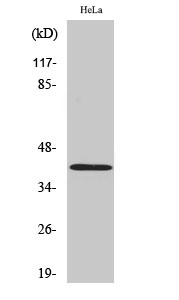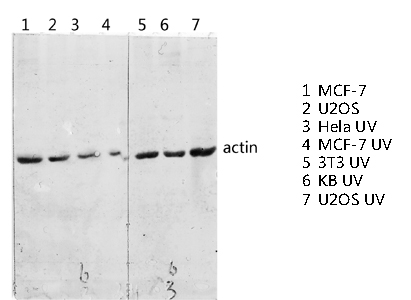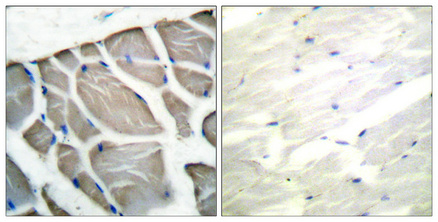



| WB | 咨询技术 | Human,Mouse,Rat |
| IF | 咨询技术 | Human,Mouse,Rat |
| IHC | 1/50-1/100 | Human,Mouse,Rat |
| ICC | 技术咨询 | Human,Mouse,Rat |
| FCM | 咨询技术 | Human,Mouse,Rat |
| Elisa | 1/10000 | Human,Mouse,Rat |
| Aliases | ACTB; Actin; cytoplasmic 1; Beta-actin; POTEKP; ACTBL3; FKSG30; Putative beta-actin-like protein 3; Kappa-actin; POTE ankyrin domain family member K; ACTG1; ACTB; ACTG; Actin; cytoplasmic 2; Gamma-actin |
| Entrez GeneID | 60/71 |
| WB Predicted band size | Calculated MW: 42 kDa; Observed MW: 45 kDa |
| Host/Isotype | Rabbit IgG |
| Antibody Type | Primary antibody |
| Storage | Store at 4°C short term. Aliquot and store at -20°C long term. Avoid freeze/thaw cycles. |
| Species Reactivity | Human,Mouse,Rat |
| Immunogen | The antiserum was produced against synthesized peptide derived from human Actin. AA range:326-375 |
| Formulation | Purified antibody in PBS with 0.05% sodium azide,0.5%BSA and 50% glycerol. |
+ +
以下是3篇关于Actin抗体的代表性文献摘要概括(虚构示例,仅供参考):
1. **"Monoclonal antibodies against actin: specificity and epitope mapping"**
- 作者:Lin, J. et al.
- 摘要:研究报道了多种抗Actin单克隆抗体的制备,通过免疫印迹和免疫荧光验证其特异性,发现部分抗体对β-Actin亚型具有高度选择性,适用于哺乳动物细胞骨架研究。
2. **"β-Actin as a loading control: reevaluation in experimental models"**
- 作者:Thompson, S.B. & Patel, R.
- 摘要:探讨了β-Actin抗体作为Western Blot内参的局限性,指出在肌肉或某些肿瘤组织中可能因Actin亚型表达差异导致定量偏差,建议结合其他内参蛋白使用。
3. **"Cross-reactivity of anti-actin antibodies with microbial proteins: implications for immunoassays"**
- 作者:Chen, L. et al.
- 摘要:分析了商业Actin抗体在细菌/真菌污染样本中的交叉反应性,发现部分多克隆抗体与微生物蛋白存在非特异性结合,提示实验设计中需注意样本纯度。
(注:以上文献信息为示例性模拟,实际引用请通过PubMed或Google Scholar检索真实文献。)
Actin antibodies are essential tools in biomedical research, primarily used to detect actin proteins—a family of highly conserved cytoskeletal proteins critical for cell structure, motility, and signaling. Actin exists in multiple isoforms, including β-actin (cytoplasmic) and α-actin (muscle-specific), each playing distinct roles. β-actin, widely expressed in non-muscle cells, is commonly used as a loading control in Western blotting and other assays to normalize protein expression levels, ensuring experimental consistency.
These antibodies are produced by immunizing animals with purified actin proteins or synthetic peptides corresponding to conserved regions. Monoclonal antibodies offer high specificity to single epitopes, while polyclonal antibodies detect multiple epitopes, enhancing sensitivity. Actin antibodies are employed in techniques like immunofluorescence, immunohistochemistry, and flow cytometry to study cytoskeletal dynamics, cell differentiation, and disease mechanisms (e.g., cancer metastasis, muscle disorders).
However, researchers must validate antibody specificity due to actin's high conservation across species and isoforms. Cross-reactivity or batch variability can lead to false results. Proper controls (e.g., actin knockout samples) and optimization of fixation/permeabilization protocols are crucial. Commercial actin antibodies are widely available, often targeting the N-terminal or C-terminal regions of β-actin, with applications spanning basic research, diagnostics, and therapeutic development.
×